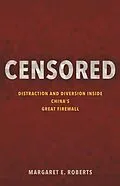A groundbreaking and surprising look at contemporary censorship in China
As authoritarian governments around the world develop sophisticated technologies for controlling information, many observers have predicted that these controls would be ineffective because they are easily thwarted and evaded by savvy Internet users. In Censored, Margaret Roberts demonstrates that even censorship that is easy to circumvent can still be enormously effective. Taking advantage of digital data harvested from the Chinese Internet and leaks from China's Propaganda Department, this important book sheds light on how and when censorship influences the Chinese public.
Roberts finds that much of censorship in China works not by making information impossible to access but by requiring those seeking information to spend extra time and money for access. By inconveniencing users, censorship diverts the attention of citizens and powerfully shapes the spread of information. When Internet users notice blatant censorship, they are willing to compensate for better access. But subtler censorship, such as burying search results or introducing distracting information on the web, is more effective because users are less aware of it. Roberts challenges the conventional wisdom that online censorship is undermined when it is incomplete and shows instead how censorship's porous nature is used strategically to divide the public.
Drawing parallels between censorship in China and the way information is manipulated in the United States and other democracies, Roberts reveals how Internet users are susceptible to control even in the most open societies. Demonstrating how censorship travels across countries and technologies, Censored gives an unprecedented view of how governments encroach on the media consumption of citizens.
Autorentext
MargaretE. Roberts is assistant professor of political science at the University of California, San Diego.
Zusammenfassung
A groundbreaking and surprising look at contemporary censorship in ChinaAs authoritarian governments around the world develop sophisticated technologies for controlling information, many observers have predicted that these controls would be ineffective because they are easily thwarted and evaded by savvy Internet users. In Censored, Margaret Roberts demonstrates that even censorship that is easy to circumvent can still be enormously effective. Taking advantage of digital data harvested from the Chinese Internet and leaks from China's Propaganda Department, this important book sheds light on how and when censorship influences the Chinese public.Roberts finds that much of censorship in China works not by making information impossible to access but by requiring those seeking information to spend extra time and money for access. By inconveniencing users, censorship diverts the attention of citizens and powerfully shapes the spread of information. When Internet users notice blatant censorship, they are willing to compensate for better access. But subtler censorship, such as burying search results or introducing distracting information on the web, is more effective because users are less aware of it. Roberts challenges the conventional wisdom that online censorship is undermined when it is incomplete and shows instead how censorship's porous nature is used strategically to divide the public.Drawing parallels between censorship in China and the way information is manipulated in the United States and other democracies, Roberts reveals how Internet users are susceptible to control even in the most open societies. Demonstrating how censorship travels across countries and technologies, Censored gives an unprecedented view of how governments encroach on the media consumption of citizens.
Inhalt
Acknowledgments ix
1 Introduction 1
1.1 The Puzzle of Porous Censorship 1
1.2 Distraction and Diversion 4
1.3 Implications and Challenges to ConventionalWisdom 10
1.4 The Plan of the Book 17
2 A Theory of Censorship 21
2.1 Why Do Governments Censor? 21
2.2 Citizens Are Rationally Ignorant 26
2.3 Traditional Media Care about Story Costs 32
2.4 Citizens Exchange Low-Cost Information Through Social Media 34
2.5 What Is Censorship? 37
2.6 The Mechanisms of Censorship 41
2.7 Fear 44
2.8 Friction 56
2.9 Flooding 80
2.10 Conclusion 92
3 Censorship in China 93
3.1 Modern History of Information Control in China 94
3.2 Censorship of the Chinese Internet 104
4 Reactions to Experience with Censorship 113
4.1 China's Targeted Censorship Strategy 117
4.2 The Costs of Observable Censorship 121
4.3 Matched Comparison of Censored and Uncensored Social Media Users 122
4.4 An Experimental Study of Consumers of Social Media 137
4.5 Conclusion 145
5 The Powerful Influence of Information Friction 147
5.1 The Effects of Content Filtering on the Spread of Information 152
5.2 Structural Frictions and the Great Firewall 162
5.3 When Does Friction Fail? 182
5.4 Conclusion 187
6 Information Flooding: Coordination as Censorship 190
6.1 What Effect Can Propaganda Have in the Digital Age? 195
6.2 Flooding in China 199
6.3 Detection of Information Flooding in Newspapers and Online Media 201
6.4 The Influence of Flooding on the Spread of Information 215
6.5 Conclusion 221
7 Implications for a Digital World 223
7.1 Why Porous Censorship Matters 224
7.2 Authoritarian Resilience 227
7.3 Implications for Free Speech in Democracies 230
7.4 A Call for Future Research 232
8 Appendix 237
8.1 Description of the China Urban Governance Survey 237
8.2 Words Related to Censorship,
Mutual Information 237
8.3 Tibet Self-Immolations Negative Binomial Model 241
Works Cited 243
Index 261
